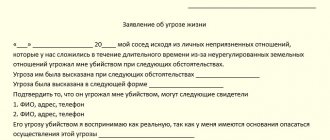What to do if you are insulted on the Internet
If this happened in an official community on social networks, then you should know that they are usually moderated for unconstructive discussions, so just wait.
If you find yourself in a “wild place,” you always have the opportunity to complain about a comment, indicating the reason as “Insult.” After a complaint, such a comment will be hidden or deleted. For information
Comments on websites are often less well moderated than on social media, but there is also a “Report” option.
If you are insulted in private messages or messenger, you can always block the sender or restrict access to your page. Please note that insults in instant messengers may subsequently be deleted by the sender without the possibility of further confirming the fact that they were there, if necessary.
I was insulted by an anonymous person on a social network. Is it possible to find him and prosecute him for this?
The general director of the Kurgan Law Firm, Ivan MENSHIKOV, answers the reader’s question: “Insults on social networks are very common, since the authors of such statements feel their “anonymity” and imaginary impunity. However, administrative liability for insult has not been abolished, and recently there has been a tendency on the part of law enforcement agencies to more effectively investigate such incidents.
What to do if you are insulted on a social network?
First of all, record this event (otherwise the author may simply delete his posts). Take screenshots of statements, correspondence, the sender’s personal page with all contact information, photographs and other data. Do not forget that the screenshots must contain a link to the page, otherwise they lose their evidentiary value.
Next, print out the screenshots, write a statement to the police at the place where the offense was committed (since it is impossible to reliably determine the location, you should contact the police department at your place of residence). In the statement, in addition to a description of the situation and screenshots, you can indicate all the information about the person who committed the insult (if you know him personally).
After collecting written explanations from the applicant, police officers, as part of the pre-investigation check, must establish who the actual author of these comments was. The investigation technique here is something like this: first, a request is sent to the administration of the social network in which the insults were written. The administration of the social network provides employees with all the registration data for the account (for example, the phone number) from which the comments were made, as well as a list of IP addresses from which the page was accessed at the time of interest.
After receiving the IP address, the Internet provider is contacted with a request to which client these addresses were delegated on the date of interest (as a rule, almost all IP addresses are dynamic) indicating the MAC address of the device from which the network was accessed.
Having identified the client, employees find out through questioning who uses this device, and initiate a case of an administrative offense under Article 5.61 of the Code of Administrative Offenses of the Russian Federation. Qualification will depend on the publicity of the insults: if the swearing was in a personal conversation, then this is part 1, if it is on the wall, in a group or in comments, this is part two. In any case, the liability for individuals is symbolic - from 1 to 3 thousand rubles.
When a person is brought to administrative responsibility, the victim has the opportunity to recover moral damages in civil proceedings. On average, courts recover about 10-15 thousand rubles.
If defamatory and false information has been posted about you
Social networks (including YouTube) have recently introduced special flags for moderators regarding misleading, harmful and abusive comments - you can take advantage of the opportunity to complain. Moderators usually respond to such statements quite quickly. To confirm that you are the victim, you may need a passport photo.
If information discrediting your honor and dignity (personal photographs, etc.) is posted on a separate website, the most effective way would be to contact its host and explain that the page contains offensive or law-breaking content. In order to find out who owns a website, you can use the Whois service. Only if you cannot reach an agreement with the hoster, is there a need to contact the authorities (with notarized screenshots).
How to bring to justice for threats in SMS?
Article 10 of the Federal Law “On the Prosecutor’s Office of the Russian Federation”.
Consideration and resolution of applications, complaints and other appeals in the prosecutor's office 1. The prosecutor's office, in accordance with their powers, resolves statements, complaints and other appeals containing information about violations of laws. The decision made by the prosecutor does not prevent a person from going to court to protect his rights. A decision on an appeal against a sentence, decision, determination and order of the court can only be appealed to a higher prosecutor. 2. Applications, complaints and other appeals received by the prosecutor's office are considered in the manner and within the time limits established by federal legislation. 3. The response to an application, complaint or other appeal must be motivated. If the application or complaint is refused, the applicant must be explained the procedure for appealing the decision, as well as the right to go to court, if provided by law. 4. The prosecutor, in accordance with the procedure established by law, takes measures to bring to justice persons who have committed offenses. 5. It is prohibited to forward a complaint to the body or official whose decisions or actions are being appealed. Article 3 of the Civil Procedure Code of the Russian Federation. Right to go to court1. An interested person has the right, in the manner established by the legislation on civil proceedings, to apply to the court for the protection of violated or disputed rights, freedoms or legitimate interests, including with a request to award him compensation for violation of the right to legal proceedings within a reasonable time or the right to execution court order within a reasonable time.
2. Waiver of the right to go to court is invalid.
3. By agreement of the parties, a dispute within the jurisdiction of the court, arising from civil legal relations, before the court of first instance makes a judicial decision, which ends the consideration of the civil case on the merits, may be referred by the parties to an arbitration court, unless otherwise established by federal law.
Article 151 of the Civil Code of the Russian Federation. Compensation for moral damage
If a citizen has suffered moral harm (physical or moral suffering) by actions that violate his personal non-property rights or encroach on intangible benefits belonging to the citizen, as well as in other cases provided for by law, the court may impose on the violator the obligation of monetary compensation for the specified harm.
When determining the amount of compensation for moral damage, the court takes into account the degree of guilt of the offender and other circumstances worthy of attention. The court must also take into account the degree of physical and moral suffering associated with the individual characteristics of the citizen who suffered harm.
If you are threatened or blackmailed
Today there is no longer any anonymity on the Internet, unless you use the darknet. A threat cannot be anonymous - it always comes from some account, phone number, address. It’s not that difficult to identify even a disguised attacker, especially for law enforcement officers.
Threat or extortion is a much more serious crime than insult. Threat is understood as the intention of one person to cause serious harm to the health of another or take his life (Article 119 of the Criminal Code of the Russian Federation); Blackmail (demanding the transfer of someone else's property... under the threat of disseminating information disgracing the victim or his relatives, or other information that could cause significant harm to the rights or legitimate interests of the victim or his relatives) is devoted to Article 163 of the Criminal Code of the Russian Federation.
If it comes to making a statement to the Ministry of Internal Affairs, list all the circumstances of what happened: who made the threat, where, how exactly, when, under what circumstances and who can confirm the fact of the threat.
To prove the fact of a threat or other negative information, notarized screenshots of correspondence may be required (the service of inspecting pages, personal messages and messages in instant messengers has recently been widely practiced by Russian notaries), which will then serve as an argument in court.
How to become immune to humiliation on social networks
In the third scene of the second act of Othello, the handsome young lieutenant Michael Cassio, humiliated and insulted, cries: “Oh, I have lost my good name! I have lost the immortal part of my being, but what remains is the animal!” Today he would not cry, but would immediately shoot himself: in the era of social networks, fake news and media assholes, reputations collapse much more rapidly than in the time of Shakespeare.
In his 2015 book So you've been publicly shamed, Welsh journalist Jon Ronson cites now textbook cases of online shaming. American dentist Walter Palmer lost his family, clients and stopped practicing after killing a rare lion while hunting in Zimbabwe. British astrophysicist and scientist Matt Taylor wore a porn shirt, which earned him the hatred of feminists around the world, for which he later apologized with tears on air. Nobel laureate Tim Hunt was forced to leave one of London's top universities because of his pointed remarks about women in science. And the tweet is on the verge of a foul: “I’m going to Africa. I hope I don't get AIDS. Joke. I'm white! An unknown PR manager, Justine Sacco, cost her not only the loss of her boyfriend, her job, her social life, but also several years in a mental hospital.
In the era of social media, fake news and media shambles, reputations are crumbling much more rapidly than in the time of Shakespeare.
Over the past year, those trampled under online humiliation have become many times more numerous, and their names are already widely known: let us remember one Kremlin critic who relished the death of “Putin’s henchmen” after the tragedy of a crashed plane; Trump's nonexistent ties to the Kremlin and numerous scandals within the White House; “Weinstein effect”; the shameful expulsion from the profession of our beloved Kevin Spacey; Even the gloss legend of photographer Bruce Weber was not spared by the wave of lynching. Here even the layman will understand that one should not underestimate the power of a retweet.
Why did everyone start expressing their opinions and attacking others?
The mess began in 2006, when the editors of Time magazine chose each of us, Web 2.0 users, as the person of the year, putting a mirrored monitor screen on the cover. If Web 1.0 was organized around pages, then in Web 2.0 every user creates, downloads and shares content of any quality. Everyone finally got their, as Andy Warhol said, five minutes of fame. Overnight, the tools for self-control of the creative professions were done away with: to paraphrase Dostoevsky, if there is no artistic council and everyone is his own writer, without distinction between a professional and an amateur, then everything is permitted.
If earlier they taught from school: “they didn’t give the ass a word” and “there was no command [to speak],” now, on the contrary, the word is given by default to any “ass,” without any instructions for use. At breakfast we log on to Facebook to lie to our friends about how great we had it at Simachev, in the afternoon on Instagram to brag about the elevator bow, and in the afternoon on Twitter to spread the news of the day to strangers. At best, we broadcast ourselves and the beautiful life around us, but much more often, having nothing to do, we end up in the hubbub of digital lynching - where this very life is destroyed in seconds.
What was it like before with the accusations?
Even before, people could endlessly slander each other on a bench and on the phone, but it’s unlikely that anyone would allow them to do this on television or in a newspaper. In the era of posts and retweets, the difference between gossip at the front door and the Vremya program is increasingly subtle. Doesn't anyone care about your opinion? No matter how it is: humiliate your neighbor, preferably a popular and likeable person, destroy his reputation, and you will get your five minutes of fame. There will be a lot of likes. The beloved examples of “group madness” “Direwolf” and “Secular Soot” have already turned into databases of the humiliated and trampled. And the latest events with a print on a black boy’s T-shirt on the H&M website and a line from a Kanye West song on Miroslava Duma’s invitation only confirm the concept of “group madness” invented by Gustave Le Bon: when people get into a crowd, they begin to lose control of themselves.
What is the threat?
When making threats of physical violence, a sober assessment of the nature of the threat, its reality, how the demands are expressed, and motives hidden at first glance will be required. There is no need to think that if you have known a person well for a long time, then he is completely safe. The attacker may well not only intimidate, but also move from verbal threats to real actions.
Terms of liability for threats
You will have to answer for personal or anonymous threats in the following cases. According to the legislation of the Russian Federation, a citizen is held accountable if the threat is characterized by the following signs:
- you are shown weapons or other equally dangerous objects;
- danger to life or health in reality in verbal form or in the form of actions;
- real threats to disseminate defamatory information.
If there are threats to your property and material assets in writing, it will not be possible to bring the offender to criminal liability, since he will be held accountable for material damage in fact. In addition to threats, there are often demands to perform certain actions or calls to refrain from them. Let's give an example. For example, this could be coercion to commit robbery if they promise to commit physical violence. Recently, requests via the Internet or telephone calls from collectors have become more frequent because you did not pay off the debt on time. This is not all, and the list goes on.
What you need to pay attention to Even with all the legality of the offender’s demands from you to perform some actions, you cannot threaten to use force, etc. If the fact of the threat is confirmed, then punishment in accordance with the Criminal Code will be required.
Insulted in the group, in the comments
If you have been publicly insulted in the comments of a group (public), look who is in the administration of this group (find “Contacts” in the right column on the group page), and first complain to the group administrators. They will be able to block this person so that he will not be able to write anything there anymore. To find out more about this, read the article “How to complain to VKontakte.”
If it is impossible to contact the group administrator, in the full version of VKontakte, hover your mouse over the offensive comment and click on the cross that appears. Then select the reason for the complaint - “Insult”. Your complaint will be considered by VK moderators.
If you cannot complain using the described method, try contacting VKontakte support. Your appeal will be considered, and if that person actually violated the rules of VKontakte, perhaps punishment will be applied to him. How to do it? Look here: “How to contact VKontakte support.” But keep in mind that your personal hostility is not a reason to block. If someone wrote something unpleasant for you, do not expect that their page will be blocked simply at your request.
If you and someone are simply insulting each other and you decide to seek support because you think that “he started it first,” then no one will deal with it. This has always happened and will happen among the people. Just keep figuring things out yourself.
How to delete your profile from “Dating”
If you unwittingly ended up in “Dating” and want to delete your profile, then you can do this in two ways. First of all, you need to go to the service and go to settings. If you want to save your profile until better times, then you should turn off the “Getting Acquainted” function: drag the slider to the left.
Screenshot of service settings
If you have no doubt about your desire to leave the service, you must click the “Delete profile” button and indicate the reason for refusing the application’s services. In case a social network user changes his mind, the profile archive will be saved for 29 days.
Screenshot of service settings
Although the Dating service does not disclose secret data and personal messages, the level of trust in the application among its users has decreased. After all, behind the publication of profiles on the dating service, people saw inept attempts to increase the popularity of the messenger.
Medialeaks previously told how a photo with the price of chicken fillet upset young Russians. Millennials complained about the high cost of food and made disappointing plans for how to continue living.
How to act and behave if you or your loved ones are threatened
A threat to life, health, well-being and business reputation is not a pleasant situation.
Unfortunately, threats are now very common, and in reality almost everyone faces them. Where the conflict could have been resolved amicably and an apology made, the matter often ends more seriously. You may not only be threatened with physical violence or disseminate information discrediting your honor, dignity and business reputation, but also be shown dangerous objects or even weapons. At first glance, threats for an unprepared person can be very scary. But it’s worth cooling down a little and thinking about how best to behave in this situation so that you and the people close to you don’t get hurt? In order to figure out how real the threat of violence is from arrogant and unpleasant people who disturb your peace, and also to develop the right line of behavior, you should listen to the advice of lawyers. If you are receiving physical threats, you should not assume that the situation will resolve on its own. Timely protection is necessary to ensure personal safety for yourself and your loved ones. This article will talk about exactly where to look for protection from threats and prevent a negative development of the situation.
Authorized bodies receiving threat statements
Traditionally, police officers are authorized to take care of the safety of citizens, so statements of threats and insults are accepted by the local police officer at the place of registration. If you are temporarily residing outside the place of registration, you can submit an application at your place of residence, but in this case, consideration of the complaint will take more time, which is necessary to transfer the document to the required department.
To avoid wasting time, you can submit a statement to the police with the help of a trusted person (but in this case you will have to draw up a power of attorney with a notary) or via the Internet. To make an application online, on the State Services website you need to select the menu item “Appeal to the Ministry of Internal Affairs”.
There are often cases when the police refuse to accept or consider an application, without recognizing the seriousness of the threat to the life and health of the applicant.
In this case, you can contact the prosecutor's office. An application for the prosecutor's office is drawn up according to a similar application for the police. You can read more about what to do if you are threatened with physical harm in the article. Please note: if a citizen knows about an impending crime that threatens the health and lives of other people, he must also report this to government authorities: the police or the prosecutor's office. Moreover, such an application can be submitted anonymously, clearly stating all the available facts.
Why the dating service on VKontakte angered users
A dating service has appeared on VKontakte. Just like in Tinder or Badu, you can like profiles and, if “reciprocity” arises, start communicating. However, many application users were dissatisfied with the innovation.
People noticed that dating profiles were compiled automatically and without their knowledge. Old photos of users were uploaded to the service and personal data was used. This caused a flurry of discontent on the Internet.
us_guz
I'm sorry, but VK is completely crazy about creating a profile for me in their new application without my knowledge and using my deleted photos and setting settings for me? Everything is fine with you, trash. I should have left a long time ago. Girls, check, you could have been included too.
Many girls began to receive messages from strangers.
faelnika
Lol, VK now has a “Dating” feature, and it creates a profile for you, doesn’t ask for your consent, and you are exposed to people... Of course, it can be deleted, but I didn’t give consent for some guys to write to me from this lack of dating site...
Unwitting users of the service saw that the application had invented hobbies for them. Some people like to “smoke for company,” while others dream of a wedding and children.
icanhand1e
I went to check just in case. Marriage, science, sports and children. Simply yelling. Thank you, we didn’t [make a mistake] with the music. Almost.
Internet users were also outraged that you can see who liked a profile and hide information about age and location only by purchasing the Premium version - 599 rubles per month.
At first, people thought that the innovation in VKontakte only concerned girls whom the application allegedly decided to match. However, it later turned out that the service also made profiles for men.
InnominateWight
They also created them for men. And even some minors. And statuses about “in a relationship” are not listed. I don’t understand at all, to be honest, how this sampling works there. It's best to check everyone.
The author of Medialeaks decided to check whether her profile was created in the Dating service. Indeed, the application posted a child photo of the correspondent on the service and informed other users that she smokes (in fact, she does not). 68 couple-seekers noticed the child’s photo and liked it.
Screenshots of the profile in “Dating” by Medialeaks
While some VKontakte users panicked and cursed the application, others built theories about the appearance of profiles and tried to remove themselves from the service.
Is it possible to block a person in a group so as not to see their offensive comments?
If you are a group administrator and there are objective reasons for blocking a person, then you can do this (you need to delete the comment with a cross, after which you will be able to delete his comments for the last week, and then block for a week; you can block for a longer period).
If the group is not yours, then you read all the methods above.
In VK there is no way to block someone in a group “for yourself” so that you alone do not see his comments. This is how the public discussion system works - everyone can speak out as long as they are not blocked in that particular group.
What's next?
And then it’s a matter of technique, both for slander and insult. The police, if you point out the offender, will definitely call him for questioning, but at the same time they will begin collecting evidence in this direction.
In particular, you will be asked:
- Information about the account, IP address and telephone number of the person who left the offensive post on the social network is requested from the administration of the social network or from the owners of the site where the post was left;
- Information about the ownership of the IP address or telephone number is requested after answering the first question from the cellular operator or Internet provider.
After receiving all the necessary information and confirming the attacker’s involvement in the offensive or slanderous post, an administrative or criminal case will be initiated.









